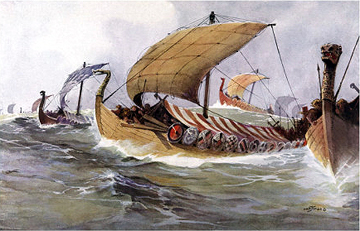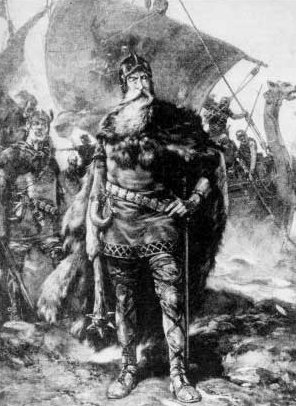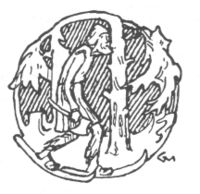The Reign of King Ingvar
Sölve and his men were working frantically to build longboats to escape. What remained of his army was now fourteen days into the stalemate with Ingvar and the Stockholmians. Ingvar was nervous as well as it was beginning to look like Sölve would escape before reinforcements arrived. Then in the early afternoon of that day King Agni of the neighboring kingdom of Svealand arrived with his army of just over four hundred mounted soldiers. While Ingvar gave a sigh of relief, Sölve grew even more nervous; should he surrender now and save the lives of his men or order them to prepare for the attack. He chose the latter. An hour later, five longboats began to make their way up the river. Sölve ordered his men to take their positions behind the chest-high palisade they had erected. The ships closed in on the pirates and their passengers came into view. Each ship contained around forty soldiers and was a mix of Ingvar's city garrison and Agni's cavalrymen. At the bow of the lead ship was Ingvar himself, eying Sölve's defenses. Across the river, the remaining soldiers began to hit their shields against their weapons and made a thunderous noise. This visibly lowered the morale of Sölve's men and as the ships grew near, a few broke the line and fled into the forest. Sölve was outnumbered by over two to one and his front line had begun to falter before the enemy was even within arrowshot. Sölve's men gave him worried looks, What do want us to do? Sölve's second in command spoke out. Sölve let out a sigh and clumsily hurdled over the palisade. The Stockholmian ships grew closer and Ingvar's men were drawing their bows. The thunder from across the river died down. Upon seeing Sölve, Ingvar ordered his men to cease rowing and called out to the sea-king, Are you prepared to surrender? Sölve took another sigh, threw his sword on the ground in front of him and called back, I will surrender as long as you let my men live. Why should I? They burned my city and killed many of my people. I have no sympathy for them. They only did so because I ordered them to. Please, no more death, these men have families too. I will cede to you my kingdom and offer my life in exchange for theirs. This seemed to satisfy Ingvar as he landed slightly down the river from Sölve's defenses. He approached along with King Agni and forty other soldiers. Sölve told his men to stand down and Ingvar ordered his entourage to take their weapons. Ingvar walked up to Sölve by himself and grabbed his sword lying on the ground. Sölve thought the king would strike him down right there in front of his men, but Ingvar instead sheathed it and pulled out a small length of rope. He bound the sea-king's hands behind his back and blindfolded him with a cloth. He then felt a firm hand on his shoulder push him forward and Ingvar's voice next to his ear, Walk." Sölve could not see through the clothe but after a short march he felt the river's water around his ankles. He was lifted out of the water and thrown on the wooden deck of the longboat. A few minutes later, he heard Ingvar's voice again, Let's go. After what seemed like an hour of sailing, Sölve realized they were not going to Stockholm, Where are we going? he called out. Ingvar's voice responded firmly, Be quiet. Sölve asked again and received the same answer. Where are my men? he asked. Again Ingvar's voice: Alive. They sailed for two days, and Sölve would ask Where are going? every so often, but received the same response from Ingvar each time. When he felt the longboat hit the shore he once again asked but this time received a different response, Gotska Sandön. Sölve knew this place well, it was an island in the middle of the Baltic with no inhabitants and no trees, it was a death sentence. The rope binding his hands was cut and was thrown out of the boat and onto a sandy beach. Sölve removed the cloth from his eyes just in time to see the last people he will ever see push off from the shore.
The scouting expedition in Eastern Europe ran into another band of nomads. The experience they gained in their earlier battles allowed the scouts to easily and swiftly defeat the attackers.
Another group of scouts traveling in the Byzantine Empire came upon a small village on the frontier. The villagers pleaded to the scouts to help defeat a small warlord that had been harassing Byzantines in the area. Their government could not spare the soldiers for they were fighting a large war in the east. Our scouts chose to aid the villagers and fought side by side with the Byzantines to defeat the warlord. They received the thanks of not only the villagers, but also the Byzantine government.
The Union was almost ready to incorporate a new district into the kingdom. Settlements in Nordland, Finland and Estonia had grown to considerable sizes since the time of Eadgils and had begun raids of their own. In just a few years the Union will be ready to set up a new administrative center in one of these territories.
Just one year after the Battle of Stockholm, King Ingvar set sail from his capital with a Swedish army of over fifteen hundred soldiers. The Swedes linked up with more soldiers from Norway and Denmark combining to form an army almost four thousand strong. After a month of sailing the armies reached the shores of the land known as Francia. They navigated up the river that led to Lutetia Parisiorum for another week. Ingvar and the raiders were only a few miles away when the city came into view from behind a forest. Ingvar ordered the soldiers to set up camp in the forest and scout out the city. After a month camped outside of Lutetia Parisiorum, an emissary from the city came to talk to Ingvar. The emissary represented the king of the Merovingian Empire, Chlothar III. His king wished to know why Ingvar and his men had taken residence outside of his capital. Ingvar responded that he would not negotiate with an emissary, but only King Chlothar himself. The emissary returned once every week for five months, but could never speak to King Ingvar or convince him to enter the city to negotiate. By now the scouts had determined that the city was poorly defended with only two thousand men armed with bows and behind minimal fortifications. Almost seven months after first making camp outside Lutetia Parisiorum, King Chlothar finally came to the camp to talk with Ingvar. As soon as Chlothar asked, Ingvar admitted that he was there to loot and sack the city. When he said this, King Chlothar was taken aback and his guards tensed up. King Ingvar then gave Chlothar an alternative; he would hand over all the gold, silver and gems in the city as well as five hundred of his subjects to be taken as slaves and his capital would be spared of complete destruction. King Chlothar immediately stood up and walked out of Ingvar's tent followed closely by his guards. The soldiers laughed at the king as he hurried out of the Norse camp. After Chlothar left, Ingvar emerged from his tent and climbed up on a large rock to speak to his men, It seems that the king of the city has refused our offer of peace. We now have no choice but to crush his army and set his precious city ablaze. The men cheered at the king's declaration and that night the whole camp erupted into a party. After the soldiers recovered from their hangovers the next afternoon they got to work making final preparations for war. Six days after Ingvar's declaration of war, the Norse army marched on Lutetia Parisiorum.
The first wave formed a shield wall as soon as they were within arrowshot of the Parisian archers. The archers were poorly trained and only a few arrows found their marks. When the raiders reached the defensive line, the archers all at once bolted toward the city in a full retreat. The Norsemen broke their formation and perused the routed soldiers with Ingvar leading at the front. The lightly armored archers were able to outrun the attackers and formed up again at the edge of the city. Ingvar refused to slow down and slammed into one of the archers before they could fire their first volley. The collision put both the king and the Parisian on the ground. King Ingvar recovered quickly and killed the soldier with his sword. The other archers launched their volley and brought down a few more Norsemen, but did not impede the advance. The raiders hit the line of archers while they reached for another arrow. The result was a bloodbath. The archers used their arrows like knives in a futile attempt to survive, and the Norse soldiers hacked them apart with swords and axes. The first wave was just finishing up with the defenders when the second arrived. King Ingvald called out to his soldiers, Their defenses have been obliterated, Tyr, Odin, Thor, all the gods are with us! Burn the city! The soldiers roared and charged through the streets of Lutetia Parisiorum torches in their hands and gold in their eyes.
The soldiers broke down doors and met screaming families huddled in corners of their homes. They grabbed all they could and left the city with their arms full of loot. Ingvald and a small group of men headed straight for the palace. He kicked down the door to find the main hall filled with gold, but empty of kings. He searched the entire building, but could not find a servant, let alone King Chlothar. He returned to the hall to help the other soldiers haul the loot out into the street. There was so much wealth in that city that a messenger was sent to bring the soldiers at camp into the town to help bring it back. Not only was the raid on Lutetia Parisiorum, the most profitable in history, but also the easiest; only twenty-one Norsemen were killed in battle that day. The loot was amassed into a large pile back at the Norse camp. King Ingvald stood upon the same rock as when he announced the attack on the city and spoke, Now to divide our plunder. Half of the wealth you see before you here will go into the coffers of the union, a quarter will go to the kings and a quarter of this is for you, the bravest warriors of Midgard. You who made the king of the city run away like a startled rabbit into the bushes. Take your share of the gold, bring it back to your families and tell your children and grandchildren that you fought alongside your king and the gods here in Francia on this great day. The men cheered and that night another party was held in the camp. One week later, the longboats were turned around and heading down the river toward home with their hulls deep in the water full of gold.
King Ingvar continued to lead raids all over Europe, but never had as much success as he did at Lutetia Parisiorum. On one of these raids, he was not so lucky. Leading a raid in the interior of Estonia, Ingvar tried to fight an army much too large for the Swedes. Ingvar's mistake cost him his life. When the raiders saw their with arrows sticking out of his back like a porcupine, they retreated back to their boats and sailed to Sweden without any plunder.





















 .
. 